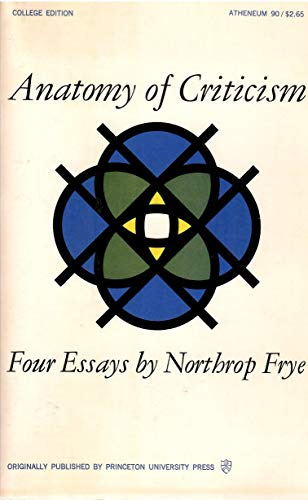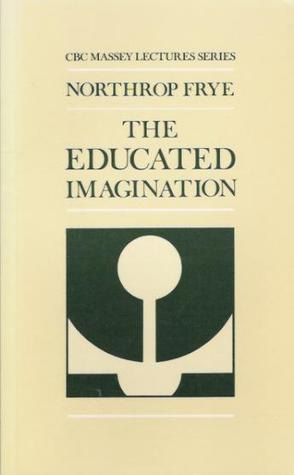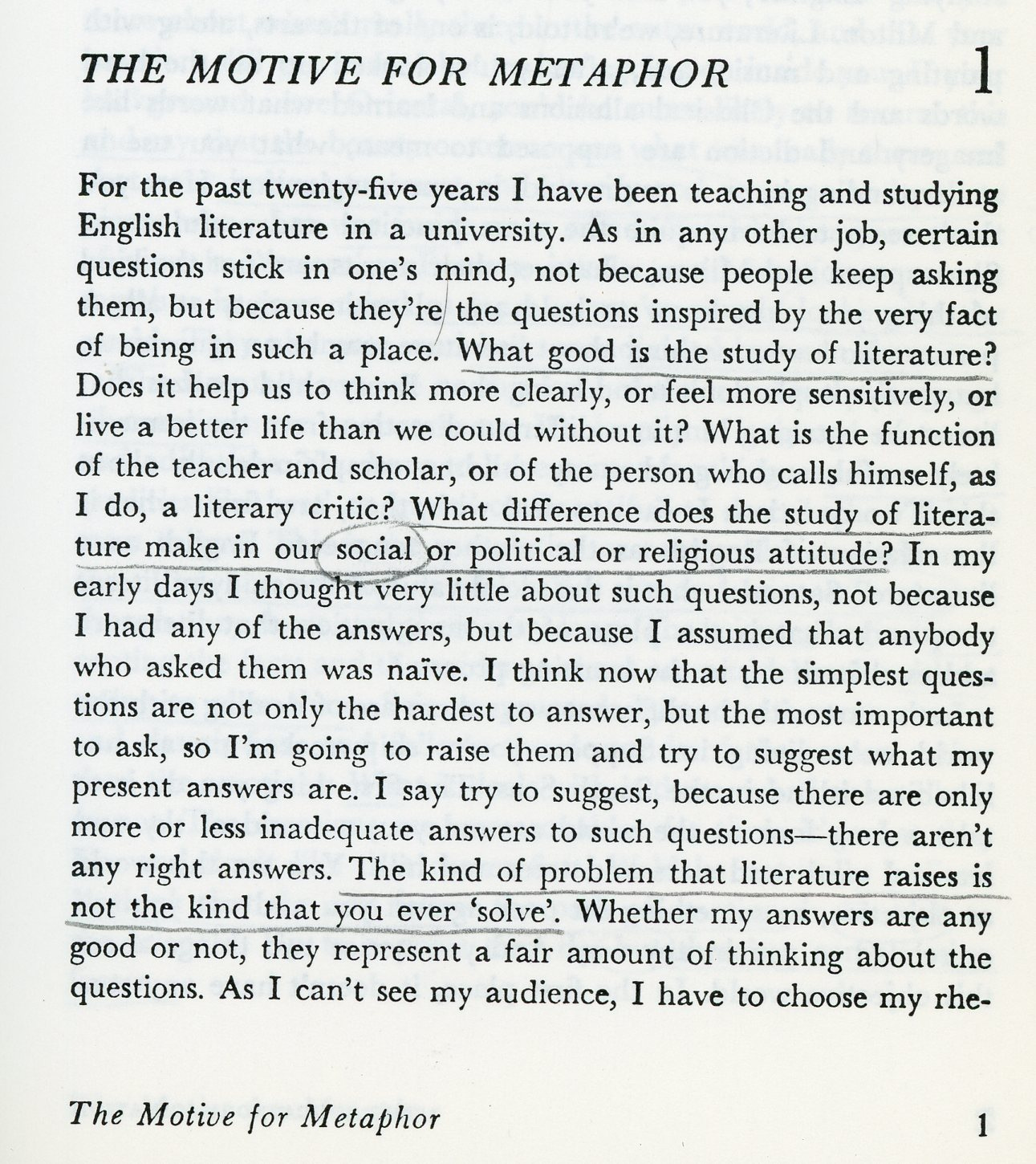I've been thinking about this one for a while now, over a month, maybe two. Three? I was going to start with an anecdote from my year as a graduate student in English literature, University of Toronto (1995-96).
"Are you a Frygian?"
I'd never heard that word before, but I said I wasn't, because I wasn't a disciple of literary critic Northrop Frye (1912-1991), though I had just referenced some element of his thought. I wasn't a disciple, but I found his thought interesting, his framework for engaging with literature. Interesting but problematic. (I remember also being asked if I was "New Historicist." That I didn't know what it meant. No, I said.)
I had graduated from the University of Waterloo in 1992, spent two years in Saskatoon, then returned to Waterloo to work part-time as an editorial assistant at the Mennonite Reporter. The other part-time I pursued freelance journalism assignments, wrote book reviews for the Kitchener-Waterloo Record and others, and tried to sustain some kind of fiction project. I decided that if I were to do a Masters Degree, now was the time. I applied to the University of Toronto, nowhere else. I was accepted very late, but I was accepted.
I was going back to school. To prepare, I decided to read Frye's The Anatomy of Criticism (1957). The only other Frye I'd read before that was The Educated Imagination (1963), which had been assigned as part of a correspondence course I took in the fall of 1990. During my BA (1987-92), I don't remember any other Frygian engagement. Post-modernism was on the rise; analysis of archetypes of out. The teaching assistant for the correspondence course, however, was a defender of "the old way of reading literature." I remember she made disparaging comments about post-modernists, which I didn't appreciate, though I also found disparaging comments by post-modernists about humanistic traditions disappointing as well.
Summer 1995, I was also reading Martin Amis's The Information (1995). I was not an Amis "fan," but he was getting a lot of press, much of it about his teeth, the death of his friendship with Julian Barnes, and the large advance he'd secured for this new novel. I'd read a number of his earlier novels, and I liked how he grappled with the contemporary. I was going to write "how he grappled with contemporary absurdities," but whether or not you find absurd what he finds absurd is likely a matter of debate. I found absurd what he found absurd. I was a young man grappling what how to be a young man. I would not have said then "I was a cishet young man grappling with how to be a cishet young man," but that is what I meant. It seemed to me there was no real way, except one must have a sense of humour about it.
So much more could be said, and maybe we'll touch on all of that later. I think Amis's masterpiece novel is Money (1984). His non-fiction masterpiece is Experience (2000). His early book reviews and literary essays, collected in The Moronic Inferno (1986), are often vicious and memorable. Over time, the sharpness of his personality faded. He has become less funny, more elder gentry, sometimes darkly earnest and dull. A person of many talents and also failures, in other words: human. What surprised in in 1995 is that The Information and Anatomy of Criticism ought to be read together, as I did. Amis is a Frygian. The Anatomy invades The Information.
Which means what, exactly? Well, it's an essayistic novel. It's main characters are writers, its obsessions literary, its digressions intelligent riffs on this, that, and everything else. In one passage, literature is classified, but it's not Amis's classification; it's Frye's. Though you might not know that, if you hadn't read Frye. Though if you've read The Anatomy only weeks earlier, boom. It's hard to miss.
At one point during my MA I was engaging the English Romantics, and I looked up Frye's book on Blake: Fearful Symmetry (1947). Skimming through it, I found a passage that stood out.
Love and wonder, then, are stages in an imaginative expansion: they establish a permanent unity of subject and object, and they lift us from a world of subject and object to a world of lover and beloved. Yet they afford us only a lower Paradise after all . . . The highest possible state, therefore, is not the union of lover and beloved, but of creator and creature, of energy and form. This latter is the state for which Blake reserves the name Eden.
Only A Lower Paradise became the title of my second book (Boheme Press, 2000), which included the novella I'd written as part of my BA. I hadn't been able to think of a good title for it, earlier, but Frye gave it to me. He also showed me that my narrative conundrums related to binaries, either/or or both (to resolve them or leave them in open interplay), had literary histories previously unknown to me, or at least unconsidered in this way.
In any case, I passed my self-assigned test of reading The Anatomy before I started my MA. It's a thick academic book, of interest to English majors, probably exclusively. Was I English major enough for it? I was. Sometimes I wonder why I didn't become an English professor, except I know why. I didn't want to. I would have liked to have remained a graduate student forever, though. My colleagues talked about, where are you going to go to do your PhD? I had no interest in a PhD. Then one of my profs said to me, don't do a PhD unless you think there isn't anything else you could possibly do with your life. She had so many PhD (literature) friends who were unemployed, under-employed, thick with publication records and student debt. One was working as a parking lot attendant, I remember. I wanted an engagement with the world. I wanted to write, not teach. I completed my MA in eight months, all classwork, no thesis. I got my paper, and I was (again) free.
As I thought about writing this piece, however, I struggled with how to frame it. That year, it seemed to me, was a fulcrum moment in my life. I met some brilliant people at U of T. Some of my colleagues had done their undergraduate degree at Harvard or Oxford. One worked as an intern at The Paris Review. He told me a story of a launch party for one issue, attended by George Plimpton (1927-2003) and at least one Playboy Bunny, circa mid-1990s. One of my MA colleagues was Aida Edemariam, later author of The Wife’s Tale: A Personal History (2018). Last time I saw her was in the late-1990s, when I attended an evening lecture by Christopher Hitchens organized by a university Palestinian student group. They showed a documentary about Palestine, produced by Edward Said, I think, and then Hitchens spoke. This was before the Said-Hitchens falling out. Before Hitchens' support for Bush II's military adventures. Hitchens stood at the podium, lit a cigarette, noted he wasn't allowed to, and dared the audience to prove him wrong. Hitchens: "statement." Hitchens: "I can prove it too, if you don't believe me." Audience: silence. After the lecture, I tried to approach Hitchens to get a book signed. He signed a couple, then turned away: "This is not why I'm here." I saw Aida nearby, then Hitchens turned and hustled out with a small group of clearly friends, Aida among them.
By the mid-1990s, I'd had some poems published in the University of Waterloo student literary magazine. I'd started sending short fiction to literary magazines across the country, and I'd started accumulating rejections, but things were about to pick up — in relative terms. I wasn't going to be hanging out with Plimpton and Bunnies, but I was starting to write fiction that would be included in my first book, Thirteen Shades of Black & White (Turnstone Press, 1999).
In Spring 1995, a local Waterloo poet, MC, organized a reading at a book store, and she asked me if I would like to read something. I said, yes, but I didn't know what. I thought I better bear down and write something good. I thought I would do something short, intense, good to perform. I tried to re-create what I'd done in the course I'd taken with Barbara Gowdy in 1992, where I'd produced a piece called "Waiting for a Miracle," which The New Quarterly would publish in 1996. I wrote a half-dozen in a short burst of a week or two. Most eventually were published, including “The Lowest Branch” (The New Quarterly, 1996), “Drew Barrymore’s Breasts” (The New Quarterly, 1997), and “Parents” (The New Quarterly, 1997), “Working It Out” (Pottersfield Portfolio, 1998) and “The Handsomest Kid” (The Antigonish Review, 1998). The 800-1,200 words story, at that moment, through the late 1990s, was my form.
As I did my MA, I lived in my parents' basement. When I finished my MA, I continued to live in my parents' basement. Spring 1996, I finished my MA and started to look for work. At the same time, my father, who worked in the eye department of Toronto Western Hospital as a photography, became increasingly ill and stopped working altogether. His doctor put him on medical leave, and he never returned to work. This, of course, was distressing to him and my mother. I don't think I realized how distressing it was, at the time. I was trying to complete my coursework, write my essays, look for a summer job, keep up writing as much as I could. I smoked cigarettes sometimes, that year, and would walk the neighbourhood at night, puffing. One night I stopped in one of the local school yards to collect my thoughts, and I was confronted by a security guard.
"What are you doing here?"
"Nothing, man. Nothing."
He let me go, saying something like, "I just figure your out walking, trying to get away from the wife."
Sure, dude. (Good line for a story, though, hey?)
I was looking for the future and not knowing how to find it. Was it in the writing? That what filled my head, but I had no connection to any literary community in Toronto. I went to readings, but I made no effort to meet anyone. I saw Martin Amis in the fall of 1995 (or early 1996?) at Harbourfront. He was charming and funny. I saw W.O. Mitchell read from The Vanishing Point (1973). I remember seeing Stephen Heighton and Bret Easton Ellis on the same bill. Heighton read something about a narwhal. Ellis attracted protesters because of American Psycho (1991).
My father lived 21 interesting years past 1996, and two decades is also how long it's been since my last smoke. But let's go back to Frye as we reach towards a conclusion. It took me a long time to get around to writing this post, because I kept changing what I wanted to say. What did Frye mean to me? What was his lasting influence? These questions brought me to something a friend, DC, said after my wife Kate's 2012 funeral. He came back to the house and was hanging around with the extended family.
"It's like a Pinter play," he said.
I had to laugh. I had a sense of what he meant, but what was more clear is that the allusion to explain what was happening, this once in a lifetime moment, the intensity and oddness of it, something so unique it can have no precedence nonetheless has a preexisting element. An archetype, perhaps. A foundation based in story. A narrative pattern that can be drawn from the vast empire of literature. Others have been here, the stories say. It is your first time, but it is not the first time. Connections to precursors can be made.
Literature is a way of knowing, I thought I might say. In fact, it's what I said to my friend that day.
"If not for literature, I don't know how I would survive," I said. "I would not know how to navigate. I would not know who I was, or how to place myself, how to not fall apart in the chaos."
Okay, I didn't say it exactly like that, but — the gist was there.
But is that how I feel about Frye, generally? No. I don't have a head full of Frygian archetypes. I have a sense of Frye's system, the connection between the genres and the seasons, the view that life is broad and complex and infinite in its mystery, and so is literature. That the two are not the same, yet are deeply connected. The connection is through the imagination, The Educated Imagination, one might say.
I didn't remember The Educated Imagination fondly. I remember reading against its conclusions, wanting to contradict it. I searched for my copy of the book and finally found it, marked up in pencil by the 1990 version of myself. Oh my, I thought. Interesting. One underlined passage: "The simple point is that literature belongs to the world man constructs, not the world he sees." I have crossed out the word "man" and written in "people." I have circled the word "constructs" and written in the margin "what is not a construct?" On the facing page, I've underlined: "in the human world the imagination has no limits." Two pages forward I have written in the margin: "Literature cannot be separated from scientific reality and social conditions simply because it lifts people to see the expanse of their imaginations." On the first page I underlined the question Frye sets for himself: "What good is the study of literature?" Then below: "The kind of problem that literature raises is not the kind that you can ever 'solve.'"
Ah, yes. These questions, these conflicts; I remember them; I remain with them; they remain unresolved. As I thought about writing this piece, I kept asking myself where I would come down on these types of questions. Where would I take my stand? I agree with my 1990 self. I don't think literature can be divorced from its social context. I agree with Frye, too. The imagination has no limits. The point from The Educated Imagination that stuck with me strongest, was Frye suggestion that what you think about a book depends on what you've read previously. When you read something, you compare it to what you have previously read, as you may compare it to your life's experiences and memories. If you have different experiences, different stored memories of books, the book will sit differently with you. Frye, of course, would say that the more educated your imagination, the more you are able to situation any single book with the infinite pantheon of books and stories. Makes sense, right? But no one can read anything. Not even Frye. So begins arguments about which are the important books, the important narratives, the foundational works that, what? Provide the best source of knowledge? Canon formation, in other words. Not a place I care to go to right now. What interests me more is, no book is an island. What's interesting is not the book, singular, but the books, plural, the pattern between books, the patterns between all sorts of things.
I wrote earlier about Marshall McLuhan, and now here about Frye, two University of Toronto luminaries, one conservative Catholic, the other pastorally Protestant. They both looked at literature as a field of information and pattern. As a young person, I thought I could enter this field, literature generally, and super-charged insights would be revealed. I have not found that to be the case. Still, I was strongly drawn to it, and it remains fulfilling, as a process of thought and feeling, a necessary filter to simply living, connecting the dots, making sense however frailly of each day and then the next.







Thanks, Michael. I've been waiting for the next instalment. I like settling in with your mind for a few pages, the recursive construction, the going away and coming back, the accretion of insight, the anecdote, the slightly mournful tone, the spikes of insight. I was no English major, came to Frye late, about the time I was writing my book on Don Quixote. I thought, Why haven't I read this before? I should have been an English major! For just that moment, when I needed it, writing about the development of the novel, he made perfect sense. (But now that I think of it, I had read The Educated Imagination as an undergraduate, too. It went straight through me without leaving a trace. Maybe that's why I wasn't cut out to be an English major.)